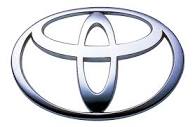Prius L4-1.8L (2ZR-FXE) Hybrid (2010)
_hybrid/Page-2009002.png)
electrical noise.
HINT
*
Disposal of the steering pad See: Air Bag Systems/Air Bag/Service and Repair/Steering Pad/Disposal
*
Disposal of the driver side knee airbag assembly See: Air Bag Systems/Air Bag/Service and Repair/Knee Airbag Assembly/Disposal
*
Disposal of the front passenger airbag assembly See: Air Bag Systems/Air Bag/Service and Repair/Front Passenger Airbag
Assembly/Disposal
*
Disposal of the curtain shield airbag assemblies See: Air Bag Systems/Air Bag/Service and Repair/Curtain Shield Airbag
Assembly/Disposal
*
Disposal of the front seat side airbag assemblies See: Air Bag Systems/Air Bag/Service and Repair/Front Seat Side Airbag Assembly
*
Disposal of the front seat outer belt assemblies See: Seat Belt Systems/Seat Belt/Service and Repair/Front Seat Outer Belt
Assembly/Disposal
(l) Never inspect the resistance of the SRS parts.
CAUTION:
Never measure the resistance of the SRS parts because current from the tester may cause the SRS parts to deploy.
4. PRECAUTION FOR DISPOSAL OF SRS PARTS (NOT DEPLOYED)
(a) Before performing pre-disposal deployment of any SRS parts, review and closely follow all applicable environmental and hazardous material
regulations. Pre-disposal deployment may be considered hazardous material treatment.
(b) Never dispose of any SRS parts that are not deployed.
(c) Deploy the SRS parts outdoors in a safe and level place where it will not disturb nearby residents.
(d) As the SRS parts produce a loud sound when deployed, be sure to inform nearby residents before deployment.
(e) When deploying the SRS parts, always use SST and keep people at least 10 m (32.8 ft.) away.
(f) The SRS parts may be accidentally deployed by static electricity. To prevent this, be sure to touch a grounded metal surface with your bare
hands to discharge any static electricity before handling the SRS parts.
(g) Do not face the airbag deployment side down when deploying an airbag.
5. PRECAUTION FOR DISPOSAL OF SRS PARTS (DEPLOYED)
(a) As the SRS parts are very hot after being deployed, allow at least 30 minutes for them to cool down sufficiently before disposal.
(b) Do not apply water etc. to any deployed SRS parts.
(c) Use gloves and safety glasses when handling any deployed SRS parts.
(d) Seal the deployed SRS parts in a thick clear plastic bag when disposing them.
(e) Always wash your hands with water after disposing of deployed SRS parts.
6. PRECAUTION FOR STEERING PAD (DRIVER AIRBAG), DRIVER SIDE KNEE AIRBAG ASSEMBLY, FRONT PASSENGER AIRBAG
ASSEMBLY, CURTAIN SHIELD AIRBAG ASSEMBLY AND FRONT SEAT SIDE AIRBAG ASSEMBLY
(a) Keep the airbag deployment side facing upward even when the airbag is temporarily removed during an operation.
CAUTION:
Always place a removed or new airbag with the deployment surface facing upward. Placing the airbag with the deployment surface
facing downward could cause a serious accident if the airbag deploys.
7. PRECAUTION FOR FRONT SEAT OUTER BELT ASSEMBLY (PRETENSIONER)
(a) Do not touch the area around the retractor even when the pretensioner is temporarily removed during an operation.
CAUTION:
If the retractor unexpectedly operates and the belt is retracted during an operation, it could cause a serious accident.
8. PRECAUTION FOR SPIRAL CABLE
(a) Do not replace the spiral cable with the battery connected and the power switch on (IG).
